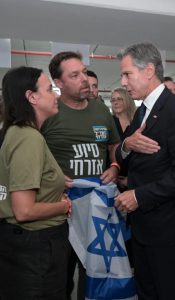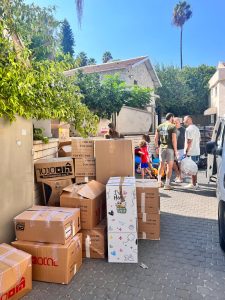Everywhere you go in Israel, the faces of the hostages are ever-present. Their photos hang on walls, street corners, and bus stops – powerful reminders of the unimaginable terror we faced and the loved ones still held captive in Gaza. Each time I see their faces, I am transported back to October 7th. As a nation, we are still living in the trauma of that day, unable to escape the horrors that unfolded. No one can forget.
On the morning of October 7th, the routine sound of sirens jolted us awake. Like many, I thought it was just another flare-up from Gaza. I hurried to take my two little girls to the safe room, thinking it would pass as it had before. But within minutes, we all realised this was something far more terrifying. Over 4,000 terrorists stormed into Southern Israel, and the massacre that followed was the most horrific we had seen since the Holocaust.
‘They caught me.’ Those were Eden Yerushalmi’s last words to her sister before she was taken. That same morning, more than 1,200 people were slaughtered, many were raped, and 251 were kidnapped – all while Hamas filmed their atrocities on GoPros. Videos circulated within hours, and families, like that of 74-year-old Holocaust survivor Bracha Levinson, learned of their loved ones’ deaths through these horrifying recordings posted online. The images of that day are still etched into our minds: terrorists firing at civilians in Sderot, partygoers running for their lives at the Nova Festival in Re’im, many watching their friends fall beside them as they desperately tried to escape.
A space for civic aid

Photo of Anthony US Secretary of State, Anthony Blinken visiting mutual aid group, Brothers and Sisters for Israel. Photo courtesy of the author.
But amidst the chaos and devastation, something extraordinary began to emerge. Brothers in Arms, a social movement originally founded by my husband Eyal Naveh as an organisation of over 80,000 activists protesting judicial reform in Israel, experienced a pivotal transformation, with Israel’s top tech leaders joining the movement. It was quickly transformed into a force for humanitarian action, focusing all of their efforts on helping the victims of the terror attacks. What began as a political movement became Brothers and Sisters for Israel, the largest Israeli civil aid organisation dedicated to supporting the people impacted by the war. This transformation was swift, and with it, the organization’s impact grew exponentially.
By 5pm on October 7th, we were already mobilising, rescuing civilians from the south. We didn’t have a concrete plan; no one knew what to do. Yet, people – ordinary citizens – simply acted. Over the next few days, we managed to rescue more than 3,000 people, creating something far greater than we could have imagined in those first chaotic hours.

Brother and Sisters for Israel mobilising to respond to communities affected by October 7 attacks. Photo courtesy of the author.
With no time to lose, on October 8th, we began organising. What started in my house quickly turned into a full-scale operation as we sent messages across every WhatsApp group, rallying people from all over the country. Leaning on the Brothers in Arms network, within days, 150,000 volunteers were on the ground, doing whatever they could to help. People from all walks of life stepped up – children, the elderly, and those from the tech ecosystem, many of whom had been protesting with us just weeks before. By the end of the first week, we were running operations out of a full warehouse, coordinating 40 specialised teams that provided psychological support to evacuees. Organized cyber experts used AI to track clues about the kidnapped hostages, and managed logistics for countless deliveries of food, medical supplies, and gear.
One of the most remarkable efforts came from our work locating the kidnapped and missing. In a matter of days, a dedicated team of 400 people from all across Israel – young and old, including some of the nation’s brightest AI experts – began working around the clock to identify and locate hostages and victims. Using advanced AI technology, this extraordinary group tirelessly processed thousands of pieces of information, successfully verifying the location and condition of hundreds of individuals. Their findings were immediately passed on to the government group responsible for locating the hostages and missing individuals, helping to uncover crucial information about many of the kidnapped. The dedication of this group was nothing short of heroic, and their impact has been profound.
Furthermore, we found housing for 8,000 displaced families, distributed 300,000 meals, delivered 40,000 ceramic vests, and established over 120 kindergartens and 180 youth centres. People opened their homes to strangers, offering shelter and safety. It was a national movement, fuelled by solidarity in a time of crisis.
Yet, our work is far from done. This isn’t just an Israeli fight. Jews around the world, who are experiencing rising antisemitism, understand that we must stand together now more than ever. They have supported us from day one, and with their help, we continue to make a real difference.
As I write this, 101 hostages remain trapped in Gaza deprived of food, water, sunlight, and basic human dignity. Their suffering is ongoing, and we cannot rest until every single one of them is brought home. We must do everything in our power to #BringThemHome.
Lee Moser is one of the founders of Brothers and Sisters for Israel, as well as the Managing Partner of AnD Ventures, an Israeli early-stage VC.
This article was published as a part of a series of pieces exploring Jewish and Israeli philanthropy’s response to October 7. Read the series here.






Comments (0)